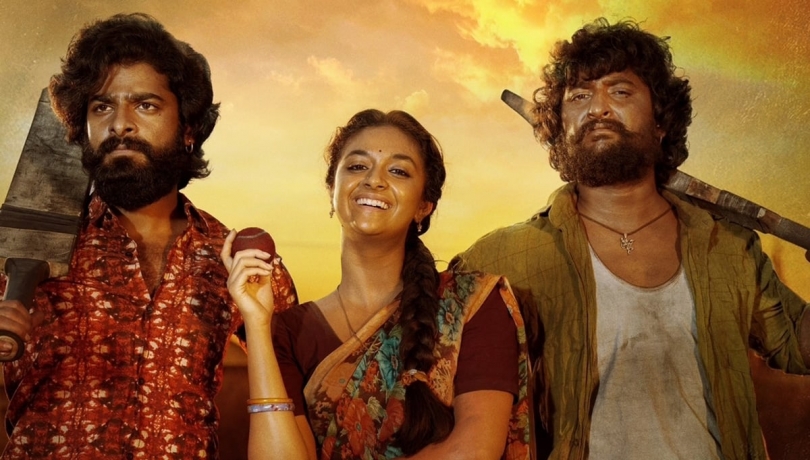
Nani’s Dasara creates Dhoom Dhaam across the earth, the moon and the sun
To north Indians, Nani means maternal grandmother. Wonder what it means in Nani’s native Telugu. His full name, though, is Ghanta Naveen Babu, and he is 39. After a dubbed success called Super Khiladi 4, in this, his 29th film, Dasara, he has a very earthy look, unshaven and with long, unruly hair. “You might be pardoned for thinking that this is the same look sported by Allu Arjun in Pushpa, though the two films are poles apart. But I tell you what. If you liked Pushpa, come and see Dasara. You will not be disappointed.”
Nani, a former RJ and assistant director, was speaking at the PVR Juhu Multiplex, where the audience was shown the teaser, the trailer and the song, ‘Dhoom Dhaam’. Also present on the occasion were heroine of the film, Keerthi Suresh, co-star Dheekshith Shetty (who makes his feature film debut), producer Srikanth Chundi Garu and surprise guest, Rana Dagubatti. Rana had come to promote his friend’s film. Nani produced his first film, D for Dopidi in 2013. His second production was Awe, in 2018.Years ago, Ajay Devgn had turned up to promote Nani’s earlier film. Nani has not forgotten that gesture. Although the Ajay Devgn starrer Bholaa is releasing on the same day as Dasara, 30 March, Nani will first go to see Bholaa and then his own film.
Sharing the experience of making Dasara, Nani confessed that it was no picnic. In fact, shooting the scenes in dust and mud was sheer torture. “But when we saw the results on the monitor, at the end of the day, it was worth every bit.” Asked by a media-person whether the story is a casualty amidst all the gory violence in Telugu films, Nani said, “This is the most emotional film of my career. Also, my character in the film is the most vulnerable one I have ever portrayed.” In an answer to another question, he responded, “Earlier, Telugu films were a notch below Hindi films. Now they have caught up and it is a level playing field.”

Keerthi (sometimes spelt Keerthy), looking stunningly sexy, confided that Nani was always open to discussion about how to do particular scenes, but he was a prankster as well, always pulling somebody’s leg. “The best part was that the unit let me be what I am at heart – a brat.” She also revealed that it took her some effort to get the Telangana dialect right. Dheekshith Shetty was reluctant to say anything, because he had been warned to keep mum. Earlier, he has spilled some beans in an interview, and therefore the gag. All he said was, “I play Nani’s friend and my name is Suri.” Explaining the name, Nani averred, “My name in the film, Dharini, stands for earth in the film, Keerthi’s name is Vennela, which is the moon and Dheekshith is the sun.”
In the videos we saw, there was a liberal flow of alcohol. I was told that at the entrance, downstairs, mock-tails were served, in liquor-like bottles, but by that time I was already on my seat in the auditorium. Compère Nitin did a competent job, with the usual trope built in, while Rana Dagubatti proved that he is fluent in English, and getting fluent in Hindi too. He has spent most of the last 12-13 years here, in Mumbai, and that should help him with the lingo. Ramanaidu Daggubati was born in Madras (present-day Chennai), Tamil Nadu to film producer D. Suresh Babu. He is named after his paternal grandfather, D. Ramanaidu, a prominent Telugu and Hindi film producer. A member of the Daggubati–Akkineni family, his paternal uncle Venkatesh, and his cousin Naga Chaitanya, are also actors.
Dasara, apparently, is a reference to the festival that precedes Deepavali. In north India, it is spelt Dussehra or Dashahra. This usually falls in October. No wonder the advertising line reads, ‘This year, Dasara will be in March.’
The song is what you would expect in a movie of its genre. It begins with a tepid qavvaalee, but when the performers have had their share of the devil’s brew, the Dhoom Dhaam begins in earnest.














